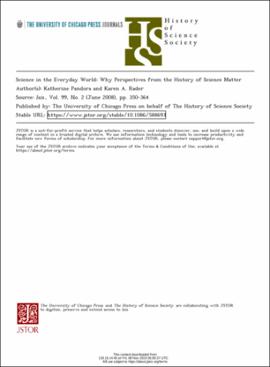| dc.contributor.author | Pandora, Katherine | |
| dc.contributor.author | Rader, Karen | |
| dc.date.accessioned | 2021-01-05T22:54:21Z | |
| dc.date.available | 2021-01-05T22:54:21Z | |
| dc.date.issued | 2008-07 | |
| dc.identifier.citation | Isis, 2008, 99(2):350-64 | en_US |
| dc.identifier.uri | https://hdl.handle.net/11244/326698 | |
| dc.description.abstract | The history of science is more than the history of scientists. This essay argues that various modem "publics" should be counted as belonging within an enlarged vision of who constitutes the "scientific community"--and describes how the history of science could be important for understanding their experiences. It gives three examples of how natural knowledge-making happens in vernacular contexts: Victorian Britain's publishing experiments in "popular science" as effective literary strategies for communicating to lay and specialist readers; twentieth-century American science museums as important and contested sites for conveying both scientific ideas and ideas about scientific practice; and contemporary mass-mediated images of the "ideal" scientist as providing counternarratives to received professional scientific norms. Finally, it suggests how humanistic knowledge might help both scientists and historians grapple more effectively with contemporary challenges presented by science in public spheres. By studying the making and elaboration of scientific knowledge within popular culture, historians of science can provide substantively grounded insights into the relations between the public and professionals. | en_US |
| dc.language | en | en_US |
| dc.subject | History of Science. | en_US |
| dc.title | Science in the everyday world - Why perspectives from the history of science matter | en_US |
| dc.type | Article | en_US |
| dc.description.peerreview | Yes | en_US |
| dc.description.peerreviewnotes | Editors assigned outside reviewers | en_US |
| dc.identifier.doi | 10.1086/588693 | en_US |
| ou.group | College of Arts and Sciences::Department of History of Science | en_US |
